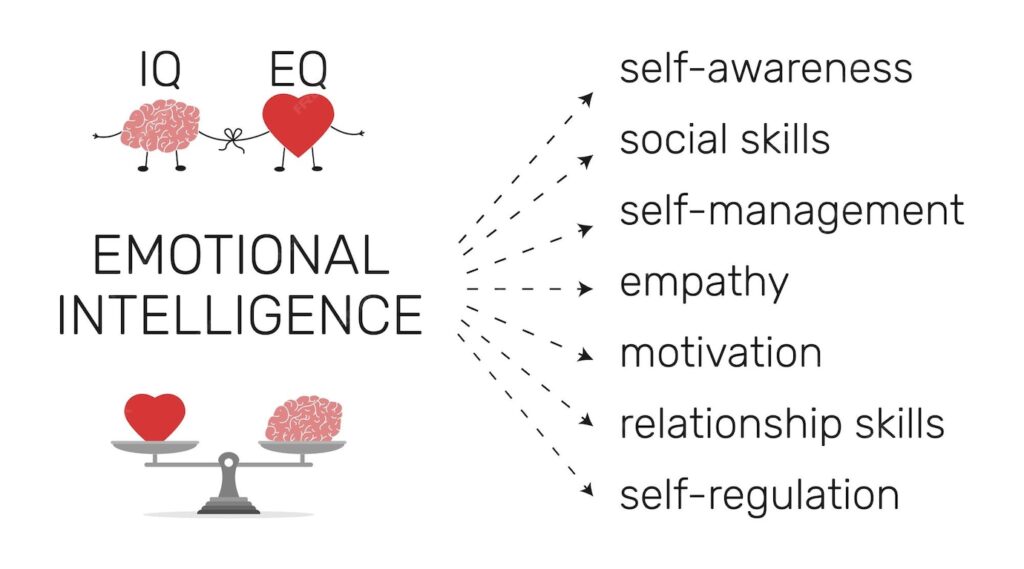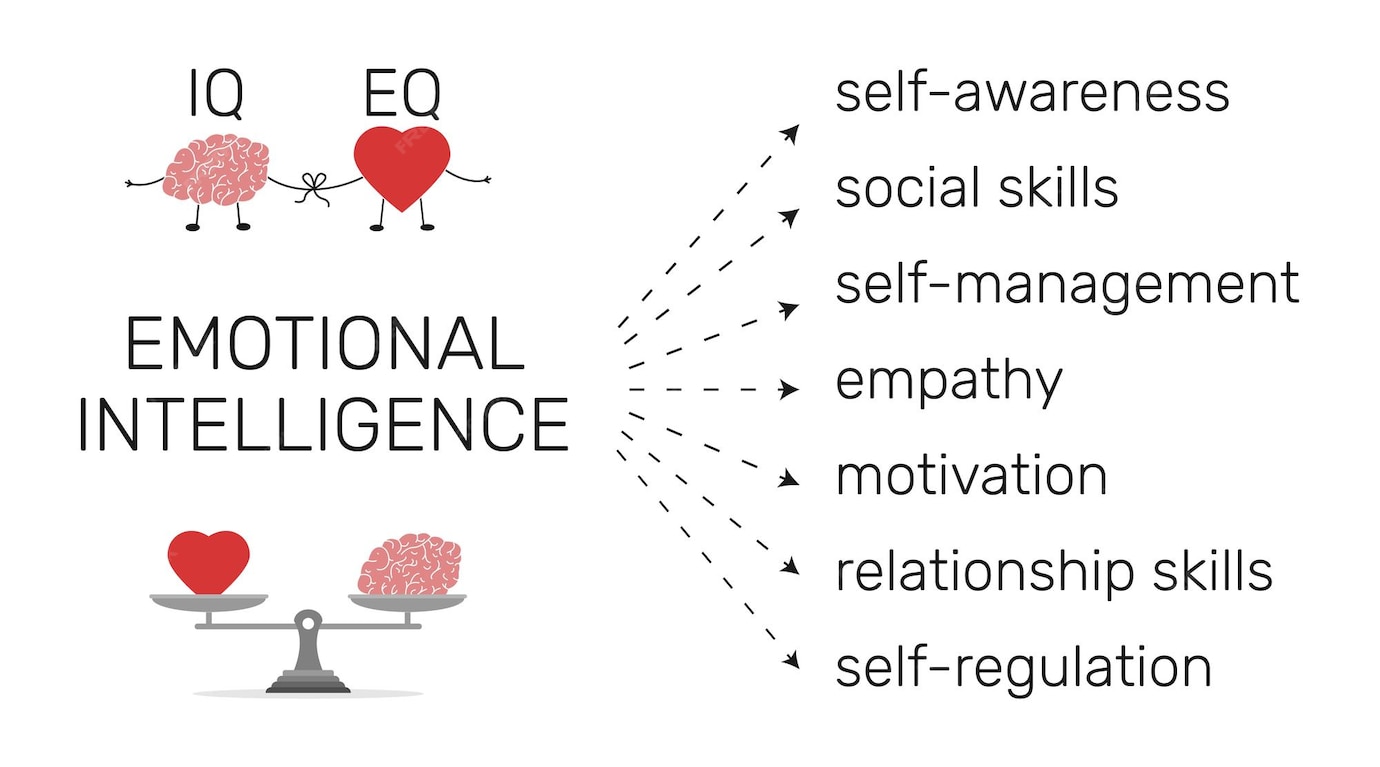
Emotional Intelligence: Unleashing Your Potential to Excel
Emotional intelligence (EI) can give you the ability to navigate complex social dynamics, build stronger relationships, and achieve greater success in both your personal and professional life. In today’s fast-paced and interconnected world, technical skills alone are no longer sufficient for thriving. The ability to understand, manage, and utilize emotions effectively has become a crucial asset. This article delves into the multifaceted ways in which emotional intelligence empowers individuals to excel in various aspects of their lives.
Understanding Emotional Intelligence
Before exploring the specific abilities EI unlocks, it’s essential to define what emotional intelligence truly entails. Emotional intelligence encompasses a range of skills, including:
- Self-awareness: Recognizing your own emotions, strengths, weaknesses, values, and motivations.
- Self-regulation: Managing your emotions effectively, controlling impulses, and adapting to changing circumstances.
- Motivation: Harnessing your emotions to pursue goals, persevere through challenges, and maintain a positive attitude.
- Empathy: Understanding and sharing the feelings of others, recognizing their perspectives, and responding with compassion.
- Social Skills: Building and maintaining strong relationships, communicating effectively, resolving conflicts, and influencing others.
Emotional Intelligence and Relationships
One of the most significant ways emotional intelligence can give you the ability to improve your life is in the realm of relationships. Whether it’s with family, friends, romantic partners, or colleagues, EI plays a pivotal role in fostering healthy and fulfilling connections.
Building Stronger Bonds
Empathy, a core component of emotional intelligence, allows you to connect with others on a deeper level. By understanding their emotions and perspectives, you can build trust, foster intimacy, and create stronger bonds. When individuals feel understood and valued, they are more likely to reciprocate with openness and support. Emotional intelligence allows you to tailor your communication style to resonate with different individuals, fostering a sense of connection and rapport.
Navigating Conflict Effectively
Conflict is inevitable in any relationship, but emotional intelligence provides the tools to navigate disagreements constructively. Self-regulation allows you to remain calm and composed during heated discussions, preventing impulsive reactions that could escalate the situation. Empathy enables you to understand the other person’s point of view, even if you don’t agree with it. By actively listening, acknowledging their feelings, and seeking common ground, you can find mutually acceptable solutions and strengthen the relationship in the process. Emotional intelligence is the key to conflict resolution. [See also: Conflict Resolution Strategies for the Workplace]
Improving Communication
Effective communication is the cornerstone of any successful relationship, and emotional intelligence enhances your ability to communicate clearly and empathetically. Self-awareness helps you understand your own communication style and identify any potential barriers. Empathy allows you to tailor your message to resonate with the other person’s emotional state and perspective. By actively listening, asking clarifying questions, and providing constructive feedback, you can ensure that your message is received accurately and that the other person feels heard and understood. This aspect of emotional intelligence can give you the ability to prevent misunderstandings and build stronger connections.
Emotional Intelligence and Career Success
In the workplace, emotional intelligence is increasingly recognized as a critical factor for success. Employers are actively seeking individuals who possess strong EI skills, recognizing their ability to lead, collaborate, and navigate complex organizational dynamics. Emotional intelligence can give you the ability to thrive in a competitive professional environment.
Leadership Skills
Leaders with high emotional intelligence are better equipped to inspire and motivate their teams. Self-awareness allows them to understand their own strengths and weaknesses, enabling them to lead with authenticity and humility. Empathy allows them to connect with their team members on a personal level, understanding their needs and concerns. By providing support, recognition, and opportunities for growth, they can foster a positive and productive work environment. Effective leaders leverage emotional intelligence to build trust, inspire loyalty, and drive results. It’s clear that emotional intelligence can give you the ability to be a better leader.
Teamwork and Collaboration
Emotional intelligence is essential for effective teamwork and collaboration. Self-regulation allows you to manage your emotions and work constructively with others, even in challenging situations. Empathy enables you to understand the perspectives of your team members and build consensus. Social skills facilitate effective communication, conflict resolution, and collaboration. By fostering a culture of trust, respect, and open communication, you can create a high-performing team that achieves its goals. Emotional intelligence allows you to navigate team dynamics and contribute effectively to collective success. [See also: Building High-Performing Teams]
Stress Management
The modern workplace can be a stressful environment, but emotional intelligence provides the tools to manage stress effectively. Self-awareness allows you to recognize your own stress triggers and develop coping mechanisms. Self-regulation enables you to control your emotions and prevent stress from overwhelming you. Motivation helps you maintain a positive attitude and persevere through challenging situations. By managing stress effectively, you can improve your overall well-being and maintain your productivity. Emotional intelligence can give you the ability to remain calm and focused under pressure.
Adaptability and Resilience
In today’s rapidly changing world, adaptability and resilience are essential qualities for success. Emotional intelligence allows you to adapt to new situations, learn from your mistakes, and bounce back from setbacks. Self-awareness helps you understand your own strengths and weaknesses, enabling you to identify areas for improvement. Self-regulation allows you to manage your emotions and maintain a positive attitude in the face of adversity. Motivation helps you persevere through challenges and achieve your goals. Emotional intelligence can give you the ability to embrace change and thrive in uncertain environments.
Emotional Intelligence and Personal Well-being
Beyond relationships and career success, emotional intelligence also plays a crucial role in personal well-being. By understanding and managing your emotions effectively, you can improve your mental health, reduce stress, and enhance your overall quality of life. Emotional intelligence can give you the ability to lead a more fulfilling and meaningful life.
Improved Mental Health
Emotional intelligence is closely linked to mental health. Self-awareness allows you to recognize and address negative emotions, such as anxiety and depression. Self-regulation enables you to manage your emotions and prevent them from spiraling out of control. By developing healthy coping mechanisms and seeking support when needed, you can improve your mental well-being and build resilience. Emotional intelligence can give you the ability to manage your mental health more effectively.
Reduced Stress
Stress is a major contributor to physical and mental health problems. Emotional intelligence provides the tools to manage stress effectively. Self-awareness allows you to recognize your stress triggers and develop coping mechanisms. Self-regulation enables you to control your emotions and prevent stress from overwhelming you. By practicing mindfulness, relaxation techniques, and other stress-reducing strategies, you can improve your overall well-being. Emotional intelligence can give you the ability to lead a less stressful life.
Increased Self-Esteem
Emotional intelligence can also contribute to increased self-esteem. Self-awareness allows you to recognize your strengths and weaknesses, fostering a more realistic and balanced view of yourself. Self-regulation enables you to manage your emotions and prevent negative self-talk. By focusing on your accomplishments and celebrating your successes, you can build confidence and improve your self-esteem. Emotional intelligence can give you the ability to feel better about yourself.
Developing Emotional Intelligence
The good news is that emotional intelligence is not a fixed trait; it can be developed and improved over time. By practicing self-awareness, self-regulation, empathy, and social skills, you can enhance your EI and unlock its numerous benefits. There are many resources available to help you develop your emotional intelligence, including books, articles, workshops, and coaching programs. It is a skill that can be honed and improved with conscious effort. Emotional intelligence can give you the ability to reach your full potential.
In conclusion, emotional intelligence can give you the ability to excel in relationships, career, and personal well-being. By understanding and managing your emotions effectively, you can build stronger connections, achieve greater success, and lead a more fulfilling life. Investing in your emotional intelligence is an investment in your future.

